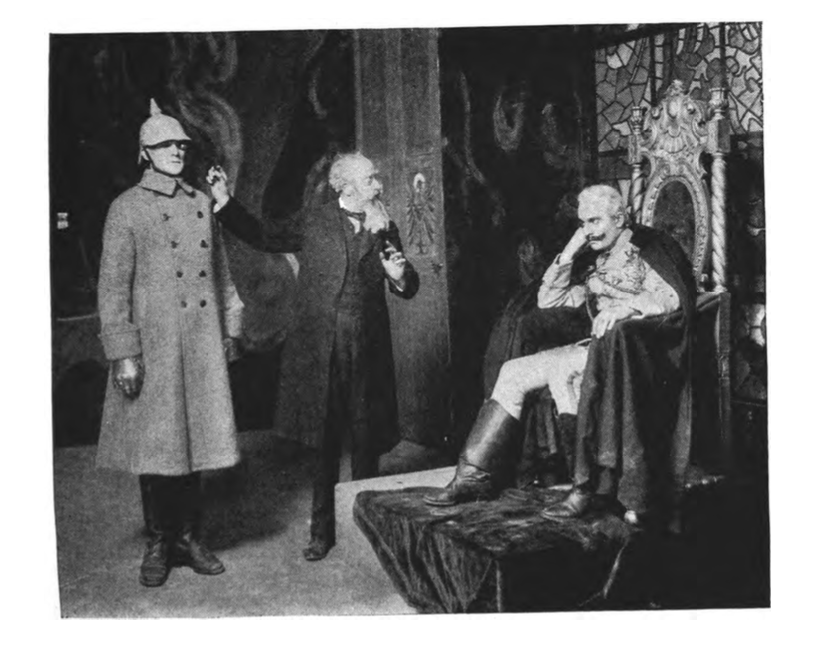BLOOD AND IRON (3)
By:
November 24, 2023

“Blood and Iron: A Play in One Act,” A Radium Age proto-sf ancestor of The Six Million Dollar Man and RoboCop, was first published in the December 1917 issue of The Strand. (Note that the play predates Karel Čapek’s “R.U.R.: Rossum’s Universal Robots” by four years.) HiLoBooks is pleased to serialize it here for HILOBROW’s readers.
ALL INSTALLMENTS: 1 | 2 | 3 | 4 | 5 | 6 | 7 | 8.
EMPEROR: You guarantee his efficiency?
SCIENTIST: Absolutely.
EMPEROR: Demonstrate.
SCIENTIST (Approaches 241, who continues to stand immobile, and very swiftly removes helmet, long cloak and cotton gloves, disclosing two metallic hands and wrists.) You ask me, your Majesty, if he is efficient. I reply, more efficient than before he fell in battle. (Crosses to corner and gets rifle. Returns to centre.) Two-forty- one, attention! Observe, your Majesty! (SCIENTIST tosses rifle to 241, who catches it surely but stiffly in his metal hands, against which the weapon clangs. SCIENTIST puts 241 through manual of arms. The whole scene following is punctuated by military commands in the following order:
“Attention!”
“Carry arms!”
“Present arms!”
“Shoulder arms!”
“Parade rest!”
And now, your Majesty, mark this! (resuming orders):
“Fix bayonets!”
“Make ready!”
“Aim!”
“Fire!”
(241 completes manoeuvres by pulling trigger and snapping lock, whereupon SCIENTIST takes rifle and tosses it to settee.)
EMPEROR (Leaning forward with look of wonderment in his face.): Colossal! (241 comes to attention and is inert again!)
SCIENTIST: Are not the possibilities impressive?
EMPEROR: Beyond our dreams!
SCIENTIST: I estimate the restoration of five army corps now immobilised because of missing arms and legs, deafened ears and blinded eyes.
EMPEROR (Meditatively.): Something of a shock — to civilisation!
SCIENTIST (Exultant.): Stupendous! We recruit from the hospitals!
EMPEROR (With dawning realisation of the magnitude of the suggestion.): And the hospitals are overflowing! My dear Professor! Science is the hope of the dynasty —
SCIENTIST: Is it not amazing?
EMPEROR: Quite!
SCIENTIST (Proceeding with examination.) A test for the ear! (SCIENTIST taps left ear of 241 gently, then crosses behind throne-chair right and makes three light taps on back of chair discernible to audience, while 241 bends ear attentively in that direction, half-turning body. SCIENTIST reappears. 241 resumes original posture, salutes and holds up three fingers.)
EMPEROR (Peering around at SCIENTIST.): What are you doing?
SCIENTIST: I tapped the throne three times, very gently. Did your Majesty not hear?
EMPEROR: No.
SCIENTIST: Ah, but the supersoldier did — ten paces distant! It is stupendous. (He crosses to table, opens portfolio, takes out a small white card.) (To EMPEROR.) With your permission. (To 241.) What is written hereon? (241 closes right eye and stares fixedly with left.)
RADIUM AGE PROTO-SF: “Radium Age” is Josh Glenn’s name for the nascent sf genre’s c. 1900–1935 era, a period which saw the discovery of radioactivity, i.e., the revelation that matter itself is constantly in movement — a fitting metaphor for the first decades of the 20th century, during which old scientific, religious, political, and social certainties were shattered. More info here.
SERIALIZED BY HILOBOOKS: James Parker’s Cocky the Fox | Annalee Newitz’s “The Great Oxygen Race” | Matthew Battles’s “Imago” | & many more original and reissued novels and stories.
